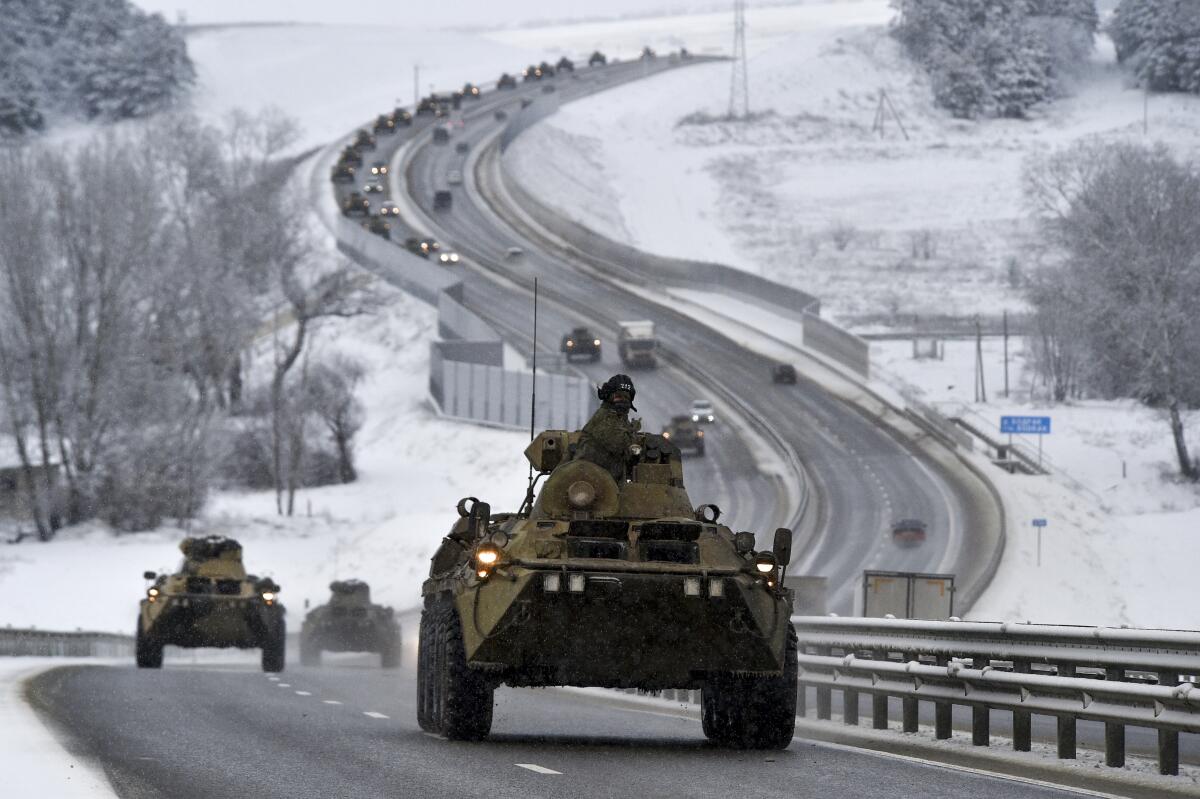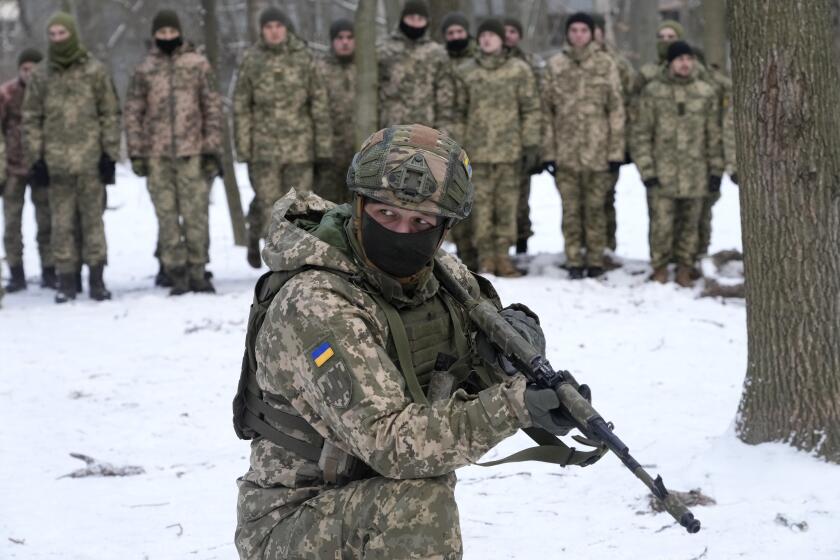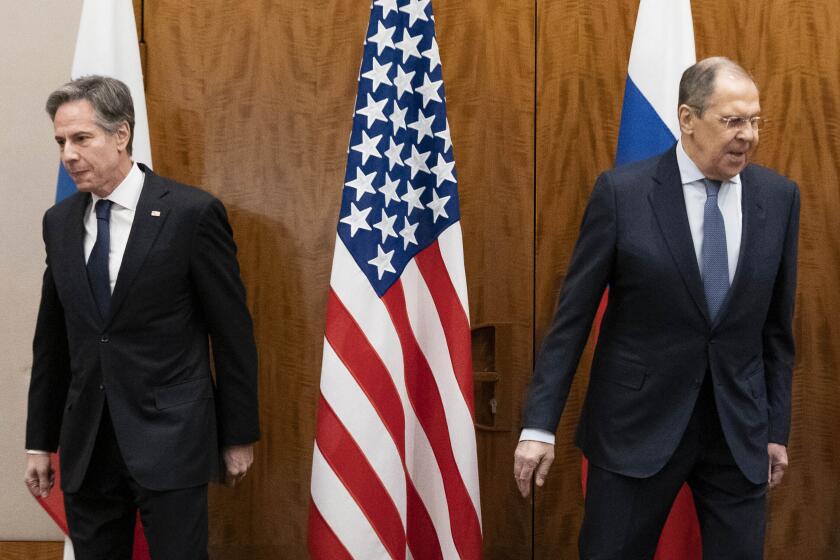Column: Can sanctions repel a Russian invasion of Ukraine?

- Share via
When President Biden made it clear that the United States would not send American troops to Ukraine over the escalating crisis there, he left himself with only a limited set of options to forestall or punish a Russian invasion.
He is continuing, for instance, to negotiate with Russian President Vladimir Putin in search of a reasoned diplomatic solution. And as of Monday, he was considering deploying thousands of troops to nearby Eastern European countries as a “deterrent.” The U.S. has also begun to provide weapons and military assistance to the Ukrainians.
So far, there’s no sign that Putin will back down.
Opinion Columnist
Nicholas Goldberg
Nicholas Goldberg served 11 years as editor of the editorial page and is a former editor of the Op-Ed page and Sunday Opinion section.
But Biden doesn’t appear disheartened, at least not publicly. That’s because he’s still counting on a third tactic that he hopes will cause Putin such pain that the Russian president will scurry home with his troops right behind him — economic sanctions.
Sanctions may not sound all that dramatic compared to drones and missiles and NATO buildups. But they are the foreign policy instrument of choice for the U.S. when it doesn’t have the political will to go to war. They’re cheaper than wars — financially and otherwise. They’re bloodless.
If China mistreats the Uyghurs and the U.S. is not ready to ignite World War III over it, we slap on sanctions. If Myanmar’s army seizes power from the elected government, same thing. And same again if Saudi Arabia murders and dismembers a dissident journalist.
I don’t mean to sound flippant. Sanctions are enormously appealing, which is why we keep going back to them. If you believe, as I do, that the U.S. rushes into war too easily, too often — but that we also need to deter human rights abusers and repressive autocrats and territorial encroachers — then of course you’re eager for a middle path between diplomacy and war.
Pentagon spokesman John Kirby said no final decisions have been made on deployments in the face of ongoing Russian aggression on the border of Ukraine.
The problem, however, is that in the years since the Cold War, the U.S. and its allies have turned to sanctions perhaps too reflexively, with too little planning and focus — and too often they have failed to achieve their goals.
It’s unclear how effective they’ll be against Russia.
Sanctions can include boycotts, embargoes, trade penalties, cuts in foreign aid, the withholding of diplomatic recognition, the freezing of assets and travel bans, among other things. They’re as old as foreign policy itself: In 432 BC Athens imposed a trade embargo on its neighbor, Megara, just before the Peloponnesian War.
But sanctions really became the go-to choice after the Cold War ended. Haiti, Libya, Iran, Iraq, Syria, countries across Africa, Venezuela, North Korea — we’ve sanctioned them all, and plenty of others.
According to a recent article in Foreign Affairs, in President Obama’s first term, an average of 500 entities (individuals and countries) were sanctioned every year. That figure almost doubled under Trump.
And that’s despite sanctions’ mixed record of success. Consider Cuba, where Fidel Castro’s regime outlasted a decades-long embargo. Or Venezuela, where President Nicolás Maduro’s government continues to defy stiff and painful sanctions.
The Russia-Ukraine crisis offers a lesson: The U.S. is still a superpower, but its ability to influence events overseas is increasingly limited.
Too frequently sanctions hurt the wrong people. In Iraq in the late 1990s, I saw malnourished babies in Baghdad hospitals and people lined up for blocks for food — while officials of Saddam Hussein’s regime still lived in palaces.
In the early 2000s, the U.S. and its allies tried to pivot to “smart” sanctions, which promised — like precision-guided weaponry — to hit their intended targets more effectively while reducing collateral damage.
“Targeted sanctions were supposedly going to focus narrowly on punishing the leaders most responsible for the terrible policies,” said George A. Lopez, a professor emeritus at the University of Notre Dame. “You’d choose from a menu. You could impose an arms embargo because you were shutting down a civil war, or block a particular commodity because the group you were targeting lived on, say, blood diamonds or timber or oil. Or you could shut down dictators’ access to their private bank accounts.”
But even today, sanctions achieve their goals only one-third to one-half of the time, studies show, and ordinary people still suffer under them. Critics on the left say they just buy time, they don’t prevent war. Others say sanctions are overused, overly broad, more costly than they appear and antagonizing to allies that get dragged into cooperating. Sometimes they backfire by uniting countries against the U.S.
Most proposals aimed at solving the Russia-Ukraine crisis won’t work. But one that requires significant concessions from both countries just might.
“Policymakers should treat them like a scalpel, not a Swiss Army Knife,” wrote Daniel W. Drezner, a professor of international politics at Tufts University, in Foreign Affairs.
In Ukraine, Biden is threatening to impose financial, technological and military sanctions within hours of an invasion, including, according to the New York Times, cutting off its largest financial institutions from global transactions. On Sunday, it was reported that the administration was considering using a novel form of export control to damage strategic industries in Russia by denying them components needed for aerospace technology, quantum computing and artificial intelligence.
But even though Biden says Russia would “pay a serious and dear price,” some experts believe sanctions may only make Putin more “obdurate.”
So yes, sanctions are no panacea. But they have worked in the past — in South Africa, in Iran, in parts of Africa and elsewhere — and must be made to do so again in the future.
They need to be linked to narrow and well-defined policy objectives. More must be done to minimize or mitigate harm to innocent populations. Multilateral buy-in is crucial.
Ukraine will be the next test case: Can the U.S. with its allies find the magic formula for influencing the behavior of adversaries without having to go to war?
More to Read
A cure for the common opinion
Get thought-provoking perspectives with our weekly newsletter.
You may occasionally receive promotional content from the Los Angeles Times.















